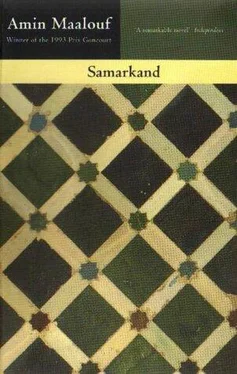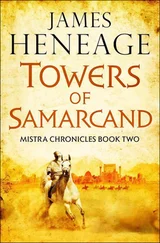However someone was approaching him, a decent-looking man clothed in a patched coat. He muttered some pious words and Nizam felt for his purse and retrieved three pieces of gold. This unknown man who would still approach him ought to be rewarded.
There was a flash, the flash of a sword and everything happened very quickly. Hardly had Nizam seen the hand move before the dagger pierced his clothing and skin and the point worked its way between his ribs. He had not even shouted out, but just made a dazed movement and gasped a last breath. As he was dying, he may have seen again, in slow motion, the blade, the arm stretching out and withdrawing and the nervous mouth which spat out: This present comes to you from Alamut!’
Then cries went up. The Assassin had run off but had been tracked from tent to tent and found. Hurriedly they slit his throat and dragged him barefoot to be thrown on to a fire.
In the years and decades to come, innumerable messengers from Alamut would meet the same death, the only difference being that they would not attempt to flee. ‘It is not enough to kill our enemies,’ Hassan taught them. ‘We are not murderers but executioners. We must act in public as an example. By killing one man we terrorize a hundred thousand. However, it is not enough to execute and terrorize, we must also know how to die, for if, by killing, we discourage our enemies from undertaking any action against us, by dying in the most courageous fashion, we force the masses to admire us, and from their midst men will come to join us. Dying is more important than killing. We kill to defend ourselves, but we die to convert, and to conquer. Conquering is the aim we are seeking; defending ourselves is only a means thereto.’
Assassinations generally took place on Friday in the mosque, at the moment of solemn prayer and in front of the assembled people. The victim, be he vizir, prince or religious dignitary, would arrive surrounded by an imposing guard. The crowd would be impressed, submissive and admiring. The emissary from Alamut would be there somewhere in the most unexpected of disguises — as a member of the guard, for example. At the moment when everyone’s gaze was on the victim, he would strike. The victim would die and the executioner would not move, but would yell out a formula he had learnt and with a smile of defiance would wait to be set upon by the furious guards and then ripped limb from limb by the frightened crowd. The message had been delivered; the successor to the person who had been assassinated would make himself more conciliatory toward Alamut, and there would be a score, or two score conversions amongst those present.
So unreal were these scenes that it was often said that Hassan’s men were drugged. How otherwise could it be explained that they went to their deaths with a smile? Some credence was given to the assertion that they were acting under the influence of hashish and it was Marco Polo who popularized this idea in the West. Their enemies in the Muslim world would contemptuously call them hash-ishiyun , ‘hashish-smokers’; some Orientalists thought that this was the origin of the word ‘assassin’, which in many European languages has become synonymous with murderer. The myth of the ‘Assassins’ was more terrifying yet.
The truth is different. According to texts which have come down to us from Alamut, Hassan liked to call his disciples Assassiyun , meaning people who are faithful to the Assass , the ‘foundation’ of the faith. This is the word, misunderstood by foreign travellers, which seemed similar to hashish.
Hassan Sabbah indeed had a passion for plants and he had a miraculous knowledge of their curative, sedative or stimulative characteristics. He himself grew all sorts of herbs and looked after his adepts when they were ill, knowing what potions to prescribe for them to revive their constitution. Thus we know of one of his recipes which was intended to stimulate his disciples’ minds and render them more adept at their studies. It was a mixture of honey, pounded nuts and coriander and was considered a very agreeable medicine. However, we must go by the evidence, in spite of the tenacity and allure of tradition: the Assassins had no drug other than straightforward faith, which was constantly reinforced by the intense instruction, the most efficient organization and the strictest apportionment of tasks.
At the top of the hierarchy sat Hassan, the Grand Master, the Supreme Preacher, the possessor of all the secrets. He was surrounded by a handful of missionaries, the da’is amongst whom there were three commissioners; one for eastern Persia, Khorassan and Kuhistan and Transoxania; one for western Persia and Iraq and one Syria. Immediately under them were the companions, the rafiks , the cadres of the movement. After receiving adequate instruction, they were entitled to command a fortress and to lead the organization at the city or province level. The brightest would one day be missionaries.
Lower down the hierarchy were the lassek , literally those who were attached to the organization. They were the rank and file believers, with no particular predisposition to studies or violent action. They included many shepherds from the Alamut region and a number of women and old men.
Then came the mujibs , the ‘answerers’, who were in fact the novices. They received some preliminary teaching and then, according to their capability, they were directed toward deeper studies in order to become companions, toward the body of the believers or toward the category which symbolized in the eyes of the Muslims of the time the real power of Hassan Sabbah, the class of the fida’is , ‘those who sacrifice themselves’. The Grand Master chose them from among the disciples who had huge reserves of faith, skill and endurance, but little aptitude for study. He never sent to his death a man who could become a missionary.
The training of a fida’i was a delicate task to which Hassan devoted himself with a passion. The fida’i would learn how to keep his dagger hidden, how to unsheathe it with stealth and plunge it into the victim’s heart, or into his neck if he was wearing a coat of mail; how to handle homing pigeons, and memorize codes to be used for rapid and secret communication with Alamut; sometimes the fida’i would have to learn a dialect or regional accent, or how to infiltrate a foreign environment and be part of it for weeks or months, lulling all distrust while awaiting the most propitious moment to strike; he would learn how to stalk his prey like a hunter, making a careful study of his behaviour, his clothing, his habits and at what time he went out and returned; sometimes, when the victim was an exceptionally well-protected personage, he would have to find a means to be employed by him, to get near to him and form a bond with some of his circle. It was told that in order to execute one of their victims, two fida’is lived for two months in a Christian convent, passing themselves off as monks. Such a remarkable talent for disguise and dissimulation could in no way have gone hand in hand with the use of hashish! Most importantly, the disciple had to acquire the necessary faith to confront death and a faith in a paradise which the martyr would earn at the very moment when his life was taken from him by the raging crowd.
No one could stand up to Hassan Sabbah. He had succeeded in building up the most feared killing machine in history. Nonetheless, another arose, at the bloody turn-of-the-century — that of the Nizamiya, which out of loyalty to the assassinated Vizir, went on to sow death with different methods which were perhaps more insidious, certainly less spectacular but whose effects were to be no less devastating.
Читать дальше












